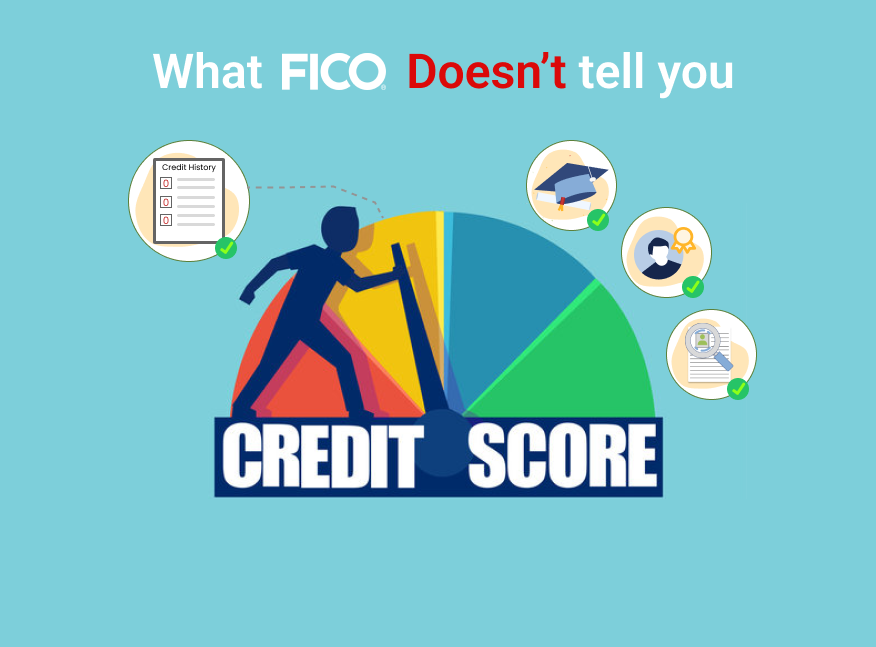The ubiquity of FICO is its greatest strength. We see advertisements talk about raising FICO scores by nine points or we are asked for our score when we take out a loan, but FICO is an opaque, limited, and ultimately flawed metric.
FICO is an abbreviation of Fair Isaac Corporation, a company that helped establish our understanding of calculating credit scores using information from the three major credit agencies. In that sentence alone, you should be able to spot some of the glaring issues around FICO. It is time that we dig deeper into FICO and discuss the issues inherent to a system that needs us to believe it has to be permanent.
Let’s start with the idea that FICO is a time-honored institution; it is not. FICO is just over 30 years old. In the grand scheme of things, we are still in the pilot program. Millennials are the first generation born into this as the standard metric and, as such, they have been stripped of some responsibilities and their perceptions of credit are warped.
At its heart, a credit score is designed to show companies how likely an individual is to pay off a loan on time. America’s modern history of credit reporting goes back to the 1820s. Then, it was largely for businesspeople, not the average citizen. In 1989, Fair, Isaac and Company (as it was then known) reconciled one of the greatest problems facing the credit industry—it interpreted data from the Big Three credit reporting bureaus (Experian, Equifax, and TransUnion) and gave a standardized result.
However, this is where another glaring issue of FICO is revealed. To call it a standardized metric is a bit of a stretch. When you get your FICO score, it will vary depending on which of the Big Three’s data you use. But this is just a breakdown of FICO’s mechanics, the real issue is that what it seeks to measure is both outdated, often faulty, and many a times exclusionary.
Thin-File People
FICO does not measure an individual’s ability to pay back a loan—it measures an individual’s ability to live with debt. If you have a high-paying job or recently graduated from a good college but were too foolish to take on a serious loan at some point in your life, FICO may flag you as a “thin file.” According to Experian, people with fewer than five credit accounts will likely earn this designation.
When you have not borrowed, they assume you cannot pay. Recent graduates, immigrants, young people, people who never had a credit card, people with few lines of credit, and those who have not used a credit card in a long while will have FICO scores that limit them. These people could have money in the bank, or they could be small business owners who are taking risks to become self-made millionaires and their score would still give them issues getting a loan, cell phone, or a decent rate for their car insurance.
Two questions arise out of this debacle: Why have we allowed this to become the gold standard? And how can we fix this broken system?
A Holistic Approach
You are bigger than a FICO score. Your education, your conduct and background, and your employment give a much richer picture of who you are and your ability to pay back a loan. To move forward, we need to embrace a holistic method for assessing individuals.
The idea that we must punish someone because they are an immigrant or because they are young is, among many other issues, a bad business practice. Companies are leaving good money on the table because they cannot justify giving a thin-file individual the same privileges as somebody with five credit cards. We need to empower individuals to make a better case for themselves instead of throwing themselves at the mercy of how FICO interprets credit bureau’s report.
Again, this is a business proposition; we have no use for “fluffy” metrics about somebody’s character. We need clear, measurable criteria that measure somebody’s potential, not their ability to have already taken on debt.
There are many commonsense metrics that we already use to establish if someone can be trusted in other industries or markets. Do you have a stable and paying job? Do you have a professional license? Do you have a criminal record? Are you educated? Questions like these give you a much clearer idea of who a person is than a FICO score. There are presently about 62 million Americans with thin files. Pretend half of them are not good candidates for loans. Pretend that those 31 million people are career criminals with no job security who have failed to pay back loans in the past. That would still leave another 31 million people who could be viable candidates. These are people who could be buying phone plans or getting favorable enough rates to buy houses. Leaving these millions of people out in the cold is a disservice to them and hugely expensive to the companies that would otherwise profit from them. There is a difference between one’s ability to pay versus willingness to pay!
Like this article? check out the original as well as more on Trua’s Medium page.
